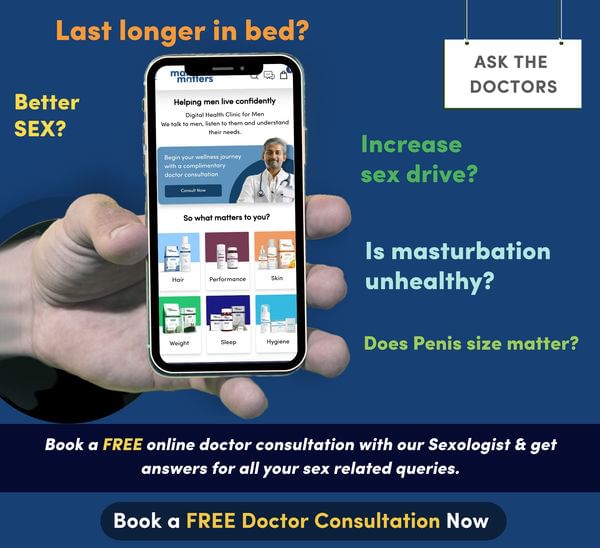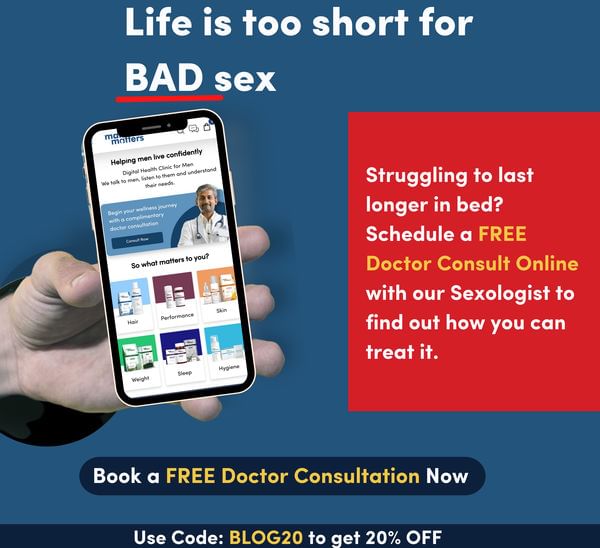Masturbation Effects on Memory & Brain: Evidence Backed Answer!
Myths surrounding masturbation are always doing the rounds. If you have ever heard that masturbation affects height negatively or ends up blinding you in the long run- these claims must be dismissed. However, there are some effects of masturbation that crop up when one performs it excessively.

Masturbation is a common and natural sexual behavior that is engaged in by both men and women. Despite being a widespread activity, there is still a considerable amount of taboo and stigma surrounding it, leading to a lack of research in this field. However, recent studies have started to explore the potential effects of masturbation on various aspects of human physiology and psychology, including memory. This has led to an interesting debate about whether masturbation can have either positive or negative effects on memory retention and recall. In this article, we will delve into the existing research and examine the potential masturbation effect on memory.

Effects of Masturbation
Myths surrounding masturbation are always doing the rounds. If you have ever heard that masturbation affects height negatively or ends up blinding you in the long run- these claims must be dismissed. However, there are some effects of masturbation that crop up when one performs it excessively.

Effects of Masturbation on Memory
There is no direct way in which masturbation affects memory. However, masturbation releases certain hormones in our brain that affect the body. Research suggests that controlled masturbation is good for overall mental health. Not only does masturbation reduce stress and strain, it also helps alleviate pain. Masturbation can negatively impact your body only if you overindulge in it.

Does Masturbation Cause Memory Loss?
Healthy levels of masturbation don't cause memory loss. However, compulsive masturbation can have adverse effects on your memory. Physical exhaustion is one of the results of excess masturbating. That, in turn, hampers attentiveness and can negatively impact memory.
Compulsive masturbation leads to the brain being drained of the hormone acetylcholine, which is a neurotransmitter. The body replaces acetylcholine with stress adrenaline that can cause memory loss and a lack of focus. Hence, excessive masturbation can cause memory loss.
Also read: How to get rid of masturbation pimples

How Does Masturbation Affect Memory?
Masturbation releases dopamine, oxytocin, endorphins and testosterone that can affect the brain. Dopamine is known as the "happiness hormone."
Research suggests that dopamine modulates a brain system called the Hippocampus that is responsible for memory retention. Dopamine is also referred to as the "motivation molecule, " which plays an essential role in feeling motivated and focused.
Many men talk about achieving more clarity after masturbating. This is due to dopamine. However, there is no scientific data to determine the effect of masturbation on memory.

Masturbation Effects on Brain
There are several positive effects of masturbation on the brain. The sudden release of several hormones promotes better physical and mental health. We've listed some of these below, along with an explanation of how masturbation affects the brain.
Positive Effects on the Brain
Hormones that are released:
1. Dopamine
Also known as the 'happiness hormone', dopamine is involved in reward-seeking and motivation. The release of dopamine can provide clarity and improve focus.

2. Oxytocin
The 'love hormone,' oxytocin promotes social and sexual behaviours linked with happiness. Oxytocin supports overall well-being and growth.
3. Serotonin
Serotonin is a chemical messenger that manages happiness and satisfaction. An increase in serotonin can improve your mood.
4. Endorphins
These 'feel good' chemicals help reduce pain and can make a person feel relaxed.
Negative Effects on the Brain
Masturbation is usually associated with positive effects on health. However, some men might feel guilty masturbating due to religious or social constructs.
Masturbating twice a week is considered healthy. However, like any good thing, excessive masturbation can cause adverse effects on health. It can lead to physical problems like irritated or broken skin and cramps.
Compulsive masturbation leads to exhaustion. This affects health and might cause disorientation. Physical fatigue can also cause absent-mindedness and a negative shift in focus. Excessive masturbation can start interfering with day-to-day life and your overall physiological well-being.

Other Physiological Effects of Masturbation
1. Masturbation Can Reduce Stress and Anxiety
The release of the hormone oxytocin is linked to lowering stress hormones like cortisol. This promotes relaxation and regulates stress responses.
2. Improves Sleep
Masturbation enhances sleep quality. A few hormones released during masturbation reduce blood pressure and stress. A 2019 study found that men had a more favourable sleep outcome after masturbating. There was a reduction in the time it takes to fall asleep.

3. Pain Reduction
The release of endorphins helps ease the pain. Endorphins are also known as the body's natural painkiller. Another hormone called Endocannabinoids is released during masturbation. These hormones help regulate pain and inflammation. A 2013 study found that sex can provide relief when it comes to migraine pain and headaches.
4. Immune Function
Masturbation raises levels of endocannabinoids and prolactin that reduce inflammation and boosts the immune system. Reduction of stress also promotes a healthy immune system.
5. Focus and Concentration
Increased dopamine levels promote better focus and concentration.

Masturbation Effects on Nerves
Masturbation is said to calm your nervous system due to the release of oxytocin and dopamine. There is no scientific evidence that establishes any negative masturbation effect on nerves. Myths link masturbation with prostate cancer, vision loss, and hair loss are false, and there is no scientific evidence to support those claims.
In A Nutshell: Does Maturbation Affect Memory and Brain?
Masturbation is a healthy practice that has multiple health benefits for men, contrary to popular opinion. Masturbation releases happy hormones in your body, but there is no solid scientific claim of it affecting memory. As for your brain, masturbation causes feel-good hormones to rush through your body and reduces stress levels as well. Despite this, learning how to control masturbation practice is critical, so you do not develop an addiction. This type of addiction could hamper your social life and personal relationships.

FAQs
Does Masturbation Affect Studies?
Masturbation, in and of itself, does not have a direct effect on studies. However, excessive masturbation or compulsive sexual behavior can lead to negative consequences such as decreased motivation, increased anxiety or depression, and difficulty focusing on academics or other responsibilities. Additionally, if masturbation becomes a coping mechanism for stress or emotional issues, it can interfere with a student's ability to effectively address and manage those underlying issues. As with any behavior, moderation, and balance are key to maintaining overall health and well-being while pursuing academic goals.
Is Masturbation Bad for Health?
Masturbation, when done in moderation and in a safe and consensual manner, is generally considered to be a healthy and normal part of human sexuality. Masturbation, in fact, has several health benefits, including stress reduction, relaxation and improved sleep, as well as improved sexual function and self-esteem. There is no scientific evidence that masturbation is harmful to one's health, and in fact, abstaining from sexual activity or masturbation for extended periods of time can cause sexual frustration, discomfort, and even pain.

Does Masturbation Release Stress?
Yes, masturbation can be an effective way to release stress and tension in the body. Sexual activity, including masturbation, releases endorphins in the brain, promoting pleasure and relaxation. Additionally, masturbation can provide a safe and consensual outlet for sexual desires and fantasies, which can be a source of stress or anxiety for some individuals. While masturbation should not be used as the sole method of stress management, it can be a healthy and beneficial part of an overall self-care routine.
Masturbation Effect on Nerves?
Masturbation, when done in a safe and consensual manner, does not have any long-term negative effects on the nerves. However, excessive or compulsive masturbation may lead to temporary numbness or tingling sensations in the genital area or hands, as well as potential injury or irritation to the skin or tissues. To avoid potential nerve damage or injury, it is critical to practice moderation and safe sexual practices, such as using lubrication and avoiding rough or aggressive stimulation. If any unusual sensations or discomfort persist, seek medical attention from a healthcare professional.

Does Masturbation Cause Brain Fog?
Masturbation does not cause brain fog. Usually, brain fog is related to stress that might be relieved due to masturbation.
Does Masturbating Make You Tired?
It is natural to feel tired after masturbating. Men often tend to feel sleepy after masturbation due to the hormones released.
Does Masturbation Cause Brain Damage?
There is no scientific evidence that links masturbation with brain damage.
References
Anke Hambach, Stefan Evers (2013) The impact of sexual activity on idiopathic headaches: An observational study (International Headache Society) https://journals.sagepub.com/doi/abs/10.1177/0333102413476374
Michele Lastella, Catherine O'Mullan (2019) Sex and Sleep: Perceptions of Sex as a Sleep Promoting Behavior in the General Adult Population (Public Health Education and Promotion) https://www.frontiersin.org/articles/10.3389/fpubh.2019.00033/full
Daphna Shohamy, R. Alison Adcock (2016) Dopamine and adaptive memory (Trends In Cognitive Sciences) https://www.cell.com/trends/cognitive-sciences/pdf/S1364-6613(10)00186-5.pdf
Stuart Brody (2010) The relative health benefits of different sexual activities (National Library of Medicine) https://pubmed.ncbi.nlm.nih.gov/20088868/

